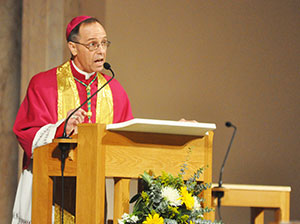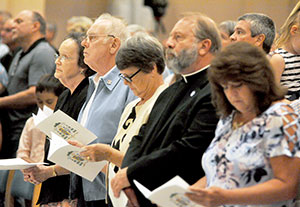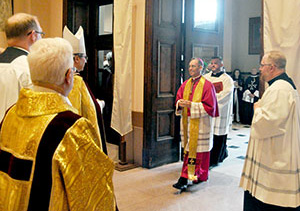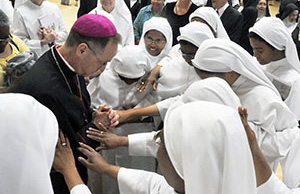Archbishop-designate Charles C. Thompson's homily from Solemn Evening Prayer with the papal nuncio
(Photo gallery from the evening | Video)
 I will turn 75 in April of 2036, the canonical retirement age at which a bishop must submit his letter of resignation to the Holy Father. As the wise saying goes, “Always begin with the end in mind.” Archbishop Pierre, the letter has not yet been drafted. During my canon law studies at St. Paul University, in Ottawa, practically each course began with reference to the last canon of the Code (canon 1752), namely, reminding us that what we were here doing was “for salvation of souls,” to keep the end in mind: the salvation of the person.
I will turn 75 in April of 2036, the canonical retirement age at which a bishop must submit his letter of resignation to the Holy Father. As the wise saying goes, “Always begin with the end in mind.” Archbishop Pierre, the letter has not yet been drafted. During my canon law studies at St. Paul University, in Ottawa, practically each course began with reference to the last canon of the Code (canon 1752), namely, reminding us that what we were here doing was “for salvation of souls,” to keep the end in mind: the salvation of the person.
Keeping the end in mind does not mean that we should dismiss the past or present. On the contrary, as Eucharistic people, we should never take for granted past or present blessings of divine grace. Tonight’s reading from the Letter to the Colossians makes this very point. These provide a framework for us to discern how best to journey forth as missionary disciples. Pope Francis has identified numerous means for this task; namely, calling us to cultivate a culture of accompaniment, dialogue, encounter, mercy and care for all of creation. He has made it clear that credible evangelization involves the ability to heal wounds and warm hearts. None of these are ends in themselves, but means to the end in mind. The immediate end, of course, is personal encounter with the person of Jesus Christ, ultimately ending salvation of souls.
 Jesus, though we have no real way of knowing just how the process evolved in his person, clearly kept the end in mind. While we have no way of knowing what he knew or understood about Himself as a child or teenager—what adolescent does—there was certainly evidence of His understanding at the Wedding at Cana, when Jesus responds to His mother, Mary, “My hour has not yet come.” [John 2:4] Embarking on public ministry, it certainly became clear that he kept the end in mind. His miracles or signs, his teaching, his engagement with people, his responses to those who reacted to his signs and teachings give evidence that he never wavered from keeping the end in mind. And to be clear, the end was not passion and death, but resurrection and salvation.
Jesus, though we have no real way of knowing just how the process evolved in his person, clearly kept the end in mind. While we have no way of knowing what he knew or understood about Himself as a child or teenager—what adolescent does—there was certainly evidence of His understanding at the Wedding at Cana, when Jesus responds to His mother, Mary, “My hour has not yet come.” [John 2:4] Embarking on public ministry, it certainly became clear that he kept the end in mind. His miracles or signs, his teaching, his engagement with people, his responses to those who reacted to his signs and teachings give evidence that he never wavered from keeping the end in mind. And to be clear, the end was not passion and death, but resurrection and salvation.
Keeping the end in mind does not mean that we know exactly how things will turn out. If that were the case, my parents might have stopped with their first child and not had my brother and sister … just sibling teasing. They're both bigger than me; I've got to be careful. Striving to read the signs of the times by engaging ourselves in prayer, study and dialogue to frame the questions properly enable us to be pointed in a proper direction with the resources needed to realize the goal. Our goals are not necessarily our initiatives. It is the Lord who calls, it is the Lord who sends. We cannot act in the place of God, but must be ever open in mind and heart to cooperating with His divine will.
 Keeping the end in mind, we are better able to discern truth based on facts rather than emotions or feelings, to more properly balance individual freedom with the common good. Keeping the end in mind, especially by reading the signs of the times and being engaged in the framing of the real questions about faith and life, we are more open to seek unity rather than perpetuate polarization, division and demonization. Keeping the end in mind, we are able to better appreciate the words of Pope Francis in his Encyclical, Laudato Si’ (“On Care for Our Common Home); “Rather than a problem to be solved, the world is a joyful mystery to be contemplated with gladness and praise.” [LS, 12] Keeping the end in mind, we more fully realize the beauty of the consistent ethic of life in the interrelatedness of our relationship with God, others, self and all of creation. Keeping the end in mind, we might no longer perceive the poor, the unborn, the immigrant, the refugee, the sick, the elderly, the addicted, the prisoner and the disabled as burdens but human beings, our brothers and sisters. Keeping the end in mind, we are equipped to safeguard the dignity of every person, defend the family, touch wounds and uphold doctrine while applying the soothing balm of pastoral care. Keeping the end in mind, justice is tempered with the sweetness of mercy. Keeping the end in mind, we have little to fear or hold us back as missionary disciples proclaiming the Joy of the Gospel, the Kingdom of God at hand, to the very margins and fringes of society. Keeping the end in mind motivates us to cultivate the virtues of courage, humility and generosity in proclaiming the beauty, goodness and truth of faith in the Holy Trinity always present and at work in our midst. Keeping the end in mind necessarily requires us to be Christ-centered rather than self-centered. Keeping the end in mind is possible, as Jesus commanded, through love of God and of neighbor. All else falls into place!
Keeping the end in mind, we are better able to discern truth based on facts rather than emotions or feelings, to more properly balance individual freedom with the common good. Keeping the end in mind, especially by reading the signs of the times and being engaged in the framing of the real questions about faith and life, we are more open to seek unity rather than perpetuate polarization, division and demonization. Keeping the end in mind, we are able to better appreciate the words of Pope Francis in his Encyclical, Laudato Si’ (“On Care for Our Common Home); “Rather than a problem to be solved, the world is a joyful mystery to be contemplated with gladness and praise.” [LS, 12] Keeping the end in mind, we more fully realize the beauty of the consistent ethic of life in the interrelatedness of our relationship with God, others, self and all of creation. Keeping the end in mind, we might no longer perceive the poor, the unborn, the immigrant, the refugee, the sick, the elderly, the addicted, the prisoner and the disabled as burdens but human beings, our brothers and sisters. Keeping the end in mind, we are equipped to safeguard the dignity of every person, defend the family, touch wounds and uphold doctrine while applying the soothing balm of pastoral care. Keeping the end in mind, justice is tempered with the sweetness of mercy. Keeping the end in mind, we have little to fear or hold us back as missionary disciples proclaiming the Joy of the Gospel, the Kingdom of God at hand, to the very margins and fringes of society. Keeping the end in mind motivates us to cultivate the virtues of courage, humility and generosity in proclaiming the beauty, goodness and truth of faith in the Holy Trinity always present and at work in our midst. Keeping the end in mind necessarily requires us to be Christ-centered rather than self-centered. Keeping the end in mind is possible, as Jesus commanded, through love of God and of neighbor. All else falls into place!
 The call to mission and holiness is directed toward the end goal, celebrating and relying upon the presence of the Lord all along the way. Tonight’s evening prayer and tomorrow’s Mass mark a new chapter in the great history of the archdiocese, as further means toward the end in mind, salvation of souls. Of course, such ceremony has no value apart from our willingness to carry out the mission of the Church, as commissioned by Jesus Christ, in ministry and service. With the ultimate end in mind, striving to be proactive rather than reactive to all that lies ahead, may we leave no stone of opportunity or challenge left uncovered, no soul left behind, throughout central and southern Indiana, and beyond, proclaiming the Good News. After all, there is still much to do before I turn 75.
The call to mission and holiness is directed toward the end goal, celebrating and relying upon the presence of the Lord all along the way. Tonight’s evening prayer and tomorrow’s Mass mark a new chapter in the great history of the archdiocese, as further means toward the end in mind, salvation of souls. Of course, such ceremony has no value apart from our willingness to carry out the mission of the Church, as commissioned by Jesus Christ, in ministry and service. With the ultimate end in mind, striving to be proactive rather than reactive to all that lies ahead, may we leave no stone of opportunity or challenge left uncovered, no soul left behind, throughout central and southern Indiana, and beyond, proclaiming the Good News. After all, there is still much to do before I turn 75.
(Photos by Sean Gallagher)
 I will turn 75 in April of 2036, the canonical retirement age at which a bishop must submit his letter of resignation to the Holy Father. As the wise saying goes, “Always begin with the end in mind.” Archbishop Pierre, the letter has not yet been drafted. During my canon law studies at St. Paul University, in Ottawa, practically each course began with reference to the last canon of the Code (canon 1752), namely, reminding us that what we were here doing was “for salvation of souls,” to keep the end in mind: the salvation of the person.
I will turn 75 in April of 2036, the canonical retirement age at which a bishop must submit his letter of resignation to the Holy Father. As the wise saying goes, “Always begin with the end in mind.” Archbishop Pierre, the letter has not yet been drafted. During my canon law studies at St. Paul University, in Ottawa, practically each course began with reference to the last canon of the Code (canon 1752), namely, reminding us that what we were here doing was “for salvation of souls,” to keep the end in mind: the salvation of the person. Jesus, though we have no real way of knowing just how the process evolved in his person, clearly kept the end in mind. While we have no way of knowing what he knew or understood about Himself as a child or teenager—what adolescent does—there was certainly evidence of His understanding at the Wedding at Cana, when Jesus responds to His mother, Mary, “My hour has not yet come.” [John 2:4] Embarking on public ministry, it certainly became clear that he kept the end in mind. His miracles or signs, his teaching, his engagement with people, his responses to those who reacted to his signs and teachings give evidence that he never wavered from keeping the end in mind. And to be clear, the end was not passion and death, but resurrection and salvation.
Jesus, though we have no real way of knowing just how the process evolved in his person, clearly kept the end in mind. While we have no way of knowing what he knew or understood about Himself as a child or teenager—what adolescent does—there was certainly evidence of His understanding at the Wedding at Cana, when Jesus responds to His mother, Mary, “My hour has not yet come.” [John 2:4] Embarking on public ministry, it certainly became clear that he kept the end in mind. His miracles or signs, his teaching, his engagement with people, his responses to those who reacted to his signs and teachings give evidence that he never wavered from keeping the end in mind. And to be clear, the end was not passion and death, but resurrection and salvation. Keeping the end in mind, we are better able to discern truth based on facts rather than emotions or feelings, to more properly balance individual freedom with the common good. Keeping the end in mind, especially by reading the signs of the times and being engaged in the framing of the real questions about faith and life, we are more open to seek unity rather than perpetuate polarization, division and demonization. Keeping the end in mind, we are able to better appreciate the words of Pope Francis in his Encyclical, Laudato Si’ (“On Care for Our Common Home); “Rather than a problem to be solved, the world is a joyful mystery to be contemplated with gladness and praise.” [LS, 12] Keeping the end in mind, we more fully realize the beauty of the consistent ethic of life in the interrelatedness of our relationship with God, others, self and all of creation. Keeping the end in mind, we might no longer perceive the poor, the unborn, the immigrant, the refugee, the sick, the elderly, the addicted, the prisoner and the disabled as burdens but human beings, our brothers and sisters. Keeping the end in mind, we are equipped to safeguard the dignity of every person, defend the family, touch wounds and uphold doctrine while applying the soothing balm of pastoral care. Keeping the end in mind, justice is tempered with the sweetness of mercy. Keeping the end in mind, we have little to fear or hold us back as missionary disciples proclaiming the Joy of the Gospel, the Kingdom of God at hand, to the very margins and fringes of society. Keeping the end in mind motivates us to cultivate the virtues of courage, humility and generosity in proclaiming the beauty, goodness and truth of faith in the Holy Trinity always present and at work in our midst. Keeping the end in mind necessarily requires us to be Christ-centered rather than self-centered. Keeping the end in mind is possible, as Jesus commanded, through love of God and of neighbor. All else falls into place!
Keeping the end in mind, we are better able to discern truth based on facts rather than emotions or feelings, to more properly balance individual freedom with the common good. Keeping the end in mind, especially by reading the signs of the times and being engaged in the framing of the real questions about faith and life, we are more open to seek unity rather than perpetuate polarization, division and demonization. Keeping the end in mind, we are able to better appreciate the words of Pope Francis in his Encyclical, Laudato Si’ (“On Care for Our Common Home); “Rather than a problem to be solved, the world is a joyful mystery to be contemplated with gladness and praise.” [LS, 12] Keeping the end in mind, we more fully realize the beauty of the consistent ethic of life in the interrelatedness of our relationship with God, others, self and all of creation. Keeping the end in mind, we might no longer perceive the poor, the unborn, the immigrant, the refugee, the sick, the elderly, the addicted, the prisoner and the disabled as burdens but human beings, our brothers and sisters. Keeping the end in mind, we are equipped to safeguard the dignity of every person, defend the family, touch wounds and uphold doctrine while applying the soothing balm of pastoral care. Keeping the end in mind, justice is tempered with the sweetness of mercy. Keeping the end in mind, we have little to fear or hold us back as missionary disciples proclaiming the Joy of the Gospel, the Kingdom of God at hand, to the very margins and fringes of society. Keeping the end in mind motivates us to cultivate the virtues of courage, humility and generosity in proclaiming the beauty, goodness and truth of faith in the Holy Trinity always present and at work in our midst. Keeping the end in mind necessarily requires us to be Christ-centered rather than self-centered. Keeping the end in mind is possible, as Jesus commanded, through love of God and of neighbor. All else falls into place!  The call to mission and holiness is directed toward the end goal, celebrating and relying upon the presence of the Lord all along the way. Tonight’s evening prayer and tomorrow’s Mass mark a new chapter in the great history of the archdiocese, as further means toward the end in mind, salvation of souls. Of course, such ceremony has no value apart from our willingness to carry out the mission of the Church, as commissioned by Jesus Christ, in ministry and service. With the ultimate end in mind, striving to be proactive rather than reactive to all that lies ahead, may we leave no stone of opportunity or challenge left uncovered, no soul left behind, throughout central and southern Indiana, and beyond, proclaiming the Good News. After all, there is still much to do before I turn 75.
The call to mission and holiness is directed toward the end goal, celebrating and relying upon the presence of the Lord all along the way. Tonight’s evening prayer and tomorrow’s Mass mark a new chapter in the great history of the archdiocese, as further means toward the end in mind, salvation of souls. Of course, such ceremony has no value apart from our willingness to carry out the mission of the Church, as commissioned by Jesus Christ, in ministry and service. With the ultimate end in mind, striving to be proactive rather than reactive to all that lies ahead, may we leave no stone of opportunity or challenge left uncovered, no soul left behind, throughout central and southern Indiana, and beyond, proclaiming the Good News. After all, there is still much to do before I turn 75.